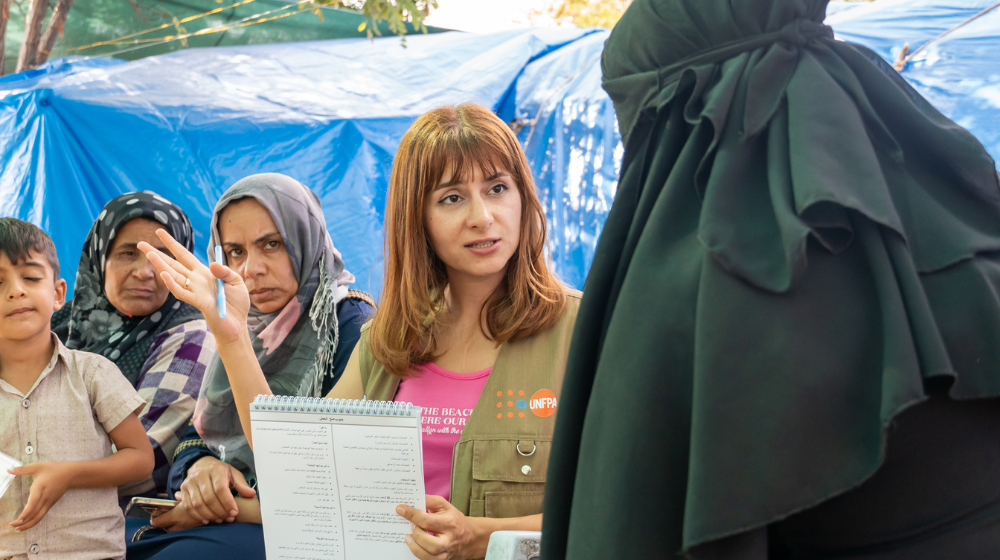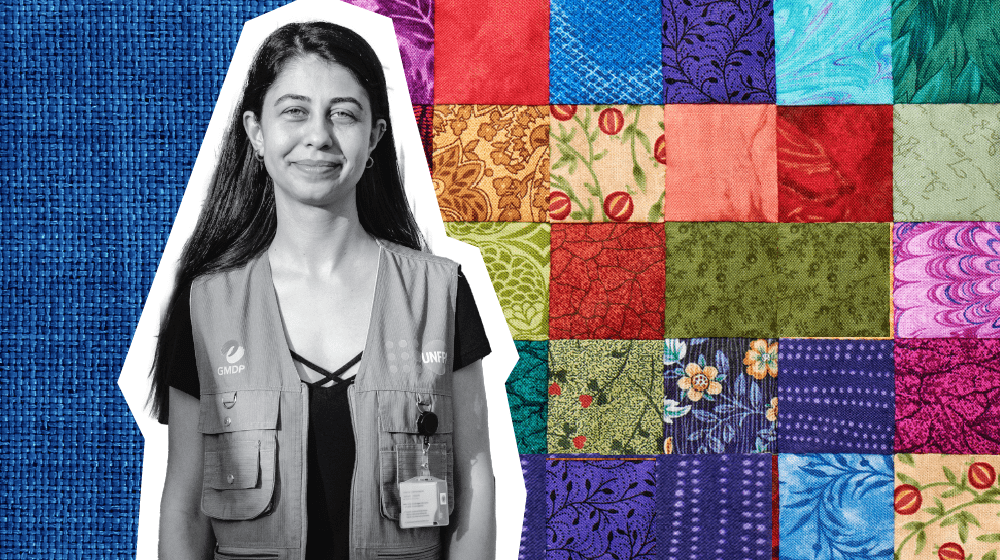Duha, a 28-year-old single mother, was already a refugee from the war in the Syrian Arab Republic, living in Türkiye’s Hatay Province, when two powerful earthquakes struck in February 2023. The disaster forced her and her three young children from their former precarious housing and into a makeshift tent.
Duha became pregnant in the aftermath of the crisis, and suffered for months from a painful urinary tract infection; she says this is common among the earthquake survivors, given the unsanitary washing facilities. “The lack of clean water has led to many kinds of infections.”
One of her biggest concerns was the scarce access to health care: Regulations under Turkish law allow registered Syrian refugees with temporary protection status to visit family and migrant health centres without paying. But in Hatay, near the epicentre of the quakes, many services were incapacitated, and others were at risk of buckling under the increased demand.
Fortunately, Duha was able to receive treatment from Dr. Eda Gülüm, a doctor working with HASUDER, the Turkish Association of Public Health Specialists, members of which have paid frequent visits to women and girls in the earthquake-affected areas.

©UNFPA Türkiye/Eren Korkmaz
Mobile units with HASUDER, supported by UNFPA, provide prenatal and postnatal consultations, as well as family planning advice and treatment for common conditions such as cystitis, vaginitis and urinary tract infections. They also deliver group information sessions on breast cancer awareness, personal hygiene, family planning and preventing sexually transmitted infections.
“We performed an abdominal examination and checked her vital signs,” Dr. Gülüm says. “We also made sure she wouldn’t miss her routine prenatal visits and gave her a ‘maternity kit’, which includes baby clothes, a blanket and toiletries.”
Duha began organizing others to seek care. “Duha was fluent in Turkish and very eager to help the health staff communicate with more women, contacting doctors and gynaecologists whenever a woman in her neighbourhood needed them,” Dr. Gülüm says.
Globally, the human right to health is articulated in many international agreements, but in displacement, conflict and other crisis settings, this right is often threatened or violated. Existing health systems can be compromised, patient populations may be uprooted and emergency responses may fail to prioritize sexual and reproductive health services – with consequences falling disproportionately on women and girls.
Dr. Gülüm and HASUDER are trying to bridge these gaps. Dr. Gülüm is fluent in Arabic and English as well as Turkish. Since August 2023, she has been serving quake-affected communities, typically seeing 10 to 30 women each day. When she’s with the mobile unit, she can visit up to 80. “The nearest hospital is about 20 minutes away by car,” she explains. “With no public transport in the area, the mobile unit also supports patients in urgent need.”
It’s a situation 22-year-old Rama (name changed), from the Syrian Arab Republic, faced. She has also been living in a tent since the earthquake. She reached out to HASUDER when she discovered she had miscarried early in her pregnancy, putting her at risk of life threatening sepsis. The mobile team helped her gain access to a public hospital where she was treated. A few days later, she called the mobile team: “I just want to let you know I got through it,” she said.
For those not intending to become pregnant, being displaced and losing access to basic health facilities also poses critical risks. “The most common conditions I see are sexually transmitted infections, urinary tract infections and unintended pregnancies,” says Ceylan Güzey, a nurse and health trainer with the UNFPA-supported Youth Approaches to Health Association (Y-PEER Türkiye) in Hatay. “I also do training and awareness-raising on these, and on family planning.”
Since May 2023, Ms. Güzey has been working chiefly with people displaced by the disaster; she explains that the team often discovers other underlying issues. While distributing maternity kits, for example, staff may identify untreated sexually transmitted infections, or violence or coercion.
“We’ve seen child and unintended pregnancies rise since the crisis, as well as reports of sexual abuse, coercion and trafficking… there’s been a very visible increase.”
To address the prevalence of unintended pregnancies, Ms. Güzey is liaising with men much more than before. “I work mainly with women, but we’ve seen more couples asking for advice together – it’s unusual, normally men don’t want to go and ask for contraceptives.”
Although the disruption in services is leading to harmful outcomes, Ms. Güzey has seen a surprising upside to bringing support directly to those displaced. “Before the earthquake, sexual and reproductive health work was more hidden, it was a kind of secret – now men are more understanding about these issues. They thought contraceptives were somehow against them, so it’s become less of a threat.”


